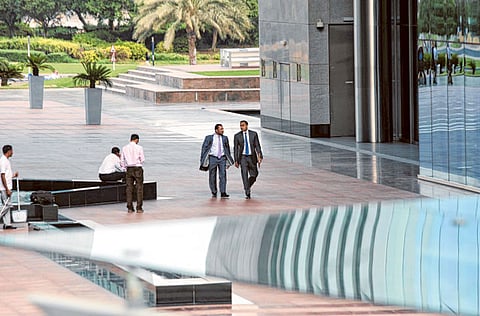More firms offer retirement, savings plans
The need to retain top talent spurs better pakages as careers become longer

Dubai: The UAE, as well as other Middle Eastern countries, is different from other labour markets in that it has no mandatory pension scheme for working expatriates. When employees leave, they generally get nothing more than a cash payout called end-of-service benefit or gratuity.
The lump sum is calculated on the length of an employee’s service and basic pay and does not generally provide a similar level of provision as European or American workers might expect to get in their state pensions.
The UAE government has recently announced plans to mandate a pension system for foreign workers, but instead of waiting for its implementation, some companies have stepped up to the plate and made sure they have supplemental schemes in place to boost workers’ departure payout.
The increasing length of stay of expatriates in the region and the need to retain top talent are some of the factors that influenced companies to sweeten their benefits offering. Foreigners who have traditionally moved to the region for shorter periods are now observed to be staying longer and establishing careers in the area.
A research by Towers Watson, a global professional services company, shows that close to a third of organisations surveyed in the Middle East region are now offering retirement and long-term savings plans to their employees.
Nearly half of them (47 per cent) are offering the supplemental benefits to their entire staff, while the rest restrict the eligibility to certain employee categories, including top management, general management, professional/clerical and manual workers.
The plans are commonly offered in the UAE and Saudi Arabia, although their prevalence is only now increasing in Egypt, Oman, Qatar and Bahrain. “In the last five years, we have seen a growth in supplementary plan provision in the region generally,” adds Ahmad Waarie, managing consultant for Towers Watson Middle East.
The End of Service Benefits in the Middle East 2012 survey included 103 respondents of which 75 operate in the UAE. They were largely local or foreign multinationals in the private sector.
Michael Brough, senior consultant at Towers Watson, observes that as workers tend to stay longer in the Middle East, companies are recognizing the need to provide supplemental retirement and savings plans. Many of these plans are provided in addition to the mandatory end-of-service benefits, so some employees receive the sum of both when they take the benefits.
However, the plans are not necessarily just for retirement, but also for alternative medium to longer term savings purposes, enabling younger members to save for cars, house deposits and other bigger projects.
“The size of the savings pot will depend on the investment performance achieved during the lifetime of the plan, as most of these are defined contribution type plans,” explains Brough.
The supplementary plans are often funded using an external vehicle, such as a trust and in most cases include an employer contribution. Some firms don’t allocate an employer contribution, but provide a savings plan for their staff.
“Retirement and savings plans can require an employee contribution or not but they typically include an employer contribution. Plans can be established without an employer contribution where the employer’s group buying power provides employees the facility for a retirement or savings plan to improve employee access to more affordable savings,” Brough adds.
Sign up for the Daily Briefing
Get the latest news and updates straight to your inbox



